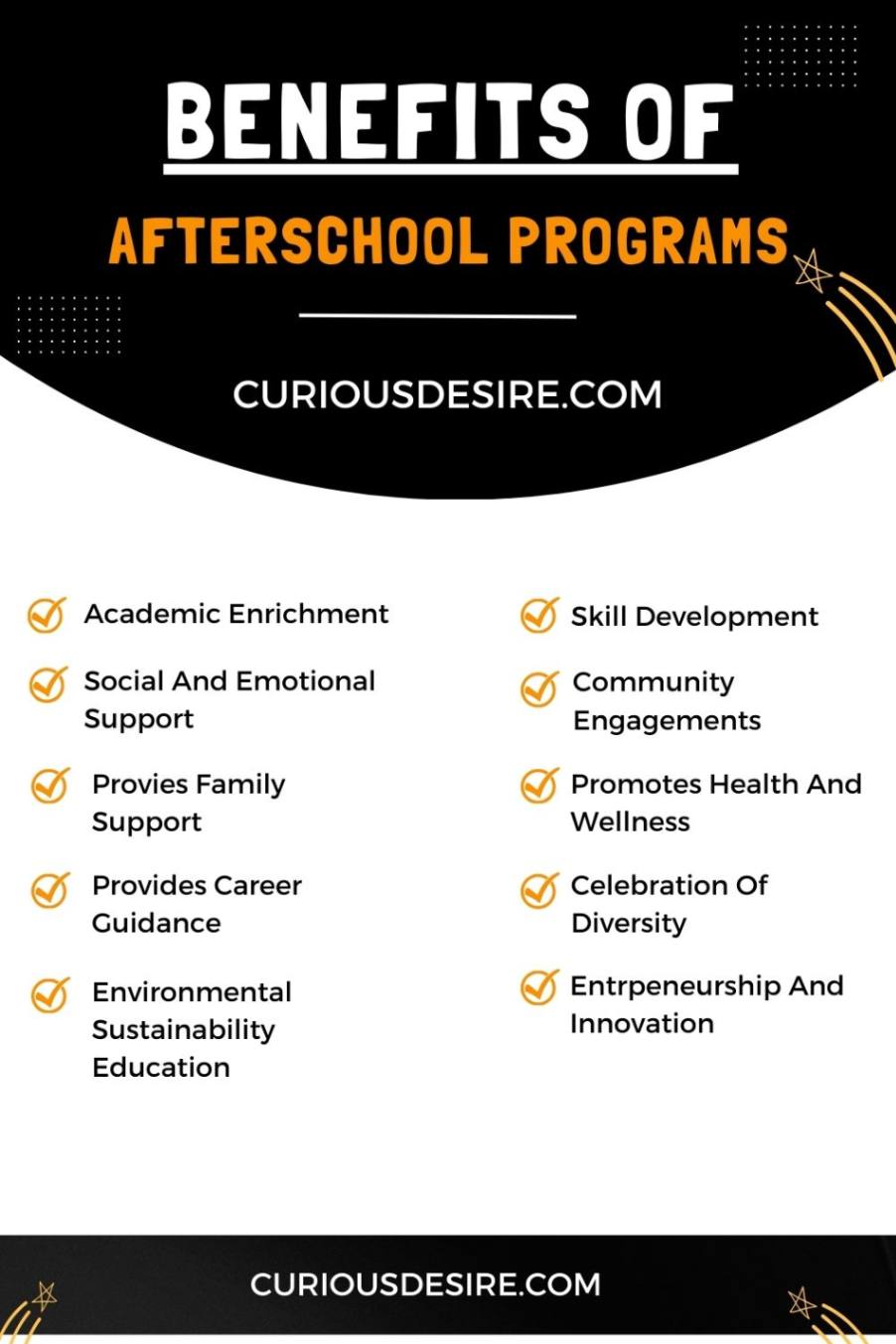In today’s fast-paced world, after-school programs have emerged as a cornerstone of academic support, personal growth, and community engagement for students. These programs offer experiences, from academic enrichment and skill-building to social interaction and emotional support.
In this blog, we’ll explore the multifaceted benefits of after-school programs, demonstrating how they contribute to the holistic development of children and adolescents.
5 Common Benefits of After-School Program
- Academic Enrichment
- Community Engagement
- Entrepreneurship and Innovation
- Career Exploration
- Social and Emotional Support

Benefit 1: Academic Enrichment
After-school programs provide a valuable extension of the learning environment, offering students the opportunity to delve deeper into subjects that interest them or seek additional support in challenging areas. Whether it’s through tutoring, homework assistance, or engaging enrichment activities, these programs can reinforce classroom learning and help students sharpen their academic skills.
Many after-school programs include hands-on learning experiences, such as STEM projects, arts and crafts, music lessons, and other extracurricular activities. These activities foster creativity, critical thinking, and problem-solving skills.
After-school programs can involve parents in their children’s educational experiences, developing a collaborative approach to supporting student learning. This can help strengthen the home-school connection and create a more comprehensive support system for students.
Benefit 2: Skill Development
Skill development is a key benefit of afterschool programs, encompassing a wide range of areas including academic, social, emotional, physical, and practical life skills.
- Communication Skills: Children interact with peers and adults, enhancing their verbal and non-verbal communication skills.
- Teamwork and Collaboration: Group activities teach children how to work effectively in teams, understand group dynamics, and collaborate towards common goals.
- Conflict Resolution: Afterschool settings often provide real-life scenarios where children learn to resolve conflicts and understand the perspectives of others.
- Emotional Intelligence: Programs can help children understand and manage their emotions, develop empathy for others, and build resilience in the face of challenges.
- Self-Esteem and Confidence: Participating in various activities and facing new challenges can boost self-esteem and confidence.
From music and arts to technology and sports, these programs offer a platform for students to explore and cultivate their talents.

Benefit 3: Social and Emotional Support
The social dynamics of after-school programs provide a nurturing environment for students to form meaningful relationships, collaborate with peers, and expand their social networks. This fosters a sense of belonging and acceptance, which is crucial for boosting self-esteem and resilience in young people.
These programs offer a space for learning, providing students with opportunities to engage in activities that may not be available during regular school hours.
After-school programs often involve community members, volunteers, and local organizations, fostering a sense of community involvement and support. This can lead to stronger community ties and a sense of shared responsibility for the well-being of young people.
Participating in after-school programs can boost children’s self-confidence and self-esteem. As they acquire new skills and experience success in various activities, they gain a sense of accomplishment and belief in their abilities.
Many after-school programs incorporate activities such as sports, art, music, or mindfulness exercises that can help children learn to regulate their emotions and cope with stress.
Benefit 4: Community Engagement
After-school programs serve as a bridge between educational institutions and the broader community, creating opportunities for meaningful engagement and civic participation.
Through volunteer initiatives, service projects, and partnerships with local organizations, students can develop a sense of civic responsibility and an understanding of their role in the community.
Engaging with various community groups helps children appreciate diversity, understand different cultures, and develop a sense of belonging and community pride.
Partnerships with local businesses, non-profits, and educational institutions can provide children and families access to resources they might otherwise lack, such as technology, expertise, or learning materials.

Benefit 5: Family Support and Work-Life Balance
After-school programs play a crucial role in providing family support and contributing to work-life balance for parents. By alleviating the challenges of work-life balance for parents, these programs enable families to meet their professional commitments while ensuring the well-being and engagement of their children.
Many programs include activities that promote teamwork, empathy, and respect, fostering an environment where children can form meaningful connections with their peers and adult mentors. These experiences contribute to a child’s overall development and well-being.
In addition, the enrichment opportunities offered by after-school programs, such as academic support, creative arts, sports, and other extracurricular activities, contribute to a well-rounded educational experience for children.
After-school programs can help to strengthen the family unit by creating a sense of balance and harmony in the daily routine.
Benefit 6: Health and Wellness Promotion
Beyond academic and social development, after-school programs contribute to participating students’ overall health and wellness. These programs offer a platform for promoting physical fitness, healthy habits, and nutrition education.
Through organized sports, recreational activities, and health-focused workshops, students have the opportunity to engage in regular exercise, thereby enhancing their physical well-being.
Additionally, by incorporating nutrition education and healthy snack options, after-school programs can instill lifelong habits of balanced and mindful eating, contributing to the overall health and vitality of students.
Benefit 7: Career Exploration and Guidance
Through career exploration workshops, mentorship programs, and hands-on experiences in different industries, students can gain a better understanding of their interests and aptitudes.
Furthermore, by connecting students with professionals and industry leaders, after-school programs provide valuable networking opportunities, offering a glimpse into the real-world applications of academic knowledge and skill sets.
Career guidance and mentorship in after-school programs can also help students navigate the transition from school to the workforce and higher education. By receiving personalized advice, resume-building support, and interview preparation, students can build essential career readiness skills and gain the confidence to pursue their aspirations.
Through these experiences, after-school programs play a pivotal role in equipping students with the knowledge, resources, and mentorship necessary to pursue meaningful and fulfilling career paths.
Benefit 8: Cultural Enrichment and Diversity Celebration
By organizing cultural events, heritage celebrations, and language learning sessions, these programs create an environment where students can appreciate and embrace various cultural traditions and perspectives.
- Exposure to Different Cultures: Afterschool programs can introduce students to various cultures through art, music, dance, language, and history, broadening their worldview.
- Breaking Down Stereotypes: By learning about different cultures, students can challenge and dismantle stereotypes and misconceptions, leading to a more inclusive mindset.
- Developing Global Awareness: Understanding different cultures and global issues prepares students to navigate an increasingly interconnected world.
- Empathy and Understanding: Exposure to diverse cultures fosters empathy, as students learn to appreciate and respect differences in backgrounds and perspectives.
- Improved Social Skills: Participating in culturally diverse groups helps students develop better social skills, including effective communication and conflict resolution.
- Building Confidence: Engaging in cultural activities, especially those related to one’s heritage, can boost self-esteem and a sense of identity.
This exposure not only enhances students’ cultural competence but also fosters respect, empathy, and open-mindedness, nurturing a sense of global citizenship.
Benefit 9: Environmental Sustainability Education
In an era of increasing environmental awareness, after-school programs play a vital role in nurturing a generation of environmentally conscious and responsible individuals.
Engagement in activities such as community clean-ups, gardening, and conservation initiatives allows students to contribute to the preservation of their local environment directly, fostering a sense of ownership and environmental stewardship.
By instilling eco-friendly practices and promoting sustainable living habits, these programs empower students to become advocates for environmental conservation within their communities.
Through these experiences, after-school programs not only contribute to the preservation of natural resources but also inspire a generation of environmentally conscious leaders who are committed to creating a more sustainable and resilient future.
Activities like nature walks, gardening, or outdoor explorations help children develop a personal connection with the environment, which is essential for fostering a sense of responsibility towards it.
Benefit10: Entrepreneurship and Innovation
Students are encouraged to think outside the box, leading to the development of original ideas and innovative solutions to problems.
By offering entrepreneurship workshops, business simulations, and startup competitions, these programs encourage students to explore their entrepreneurial potential and develop essential skills such as critical thinking, problem-solving, and strategic planning.
These programs provide a space for brainstorming and refining ideas, essential skills in any entrepreneurial venture. Students learn fundamental business concepts such as marketing, finance, and operations, providing a solid foundation for future entrepreneurial endeavors.
Students learn to analyze markets, competition, and risks, which are critical skills in both entrepreneurship and general decision-making.
Source: Capture Your Flag YT Channel
Conclusion
The benefits of afterschool programs are immeasurable, encompassing a wide array of positive outcomes for students, families, and communities. These programs play a vital role in shaping the academic, social, and emotional development of young learners.
Together, let’s continue fostering an environment where every child has the opportunity to thrive, learn, and succeed beyond the school bell, laying the groundwork for a more promising and vibrant tomorrow.
After School Programs Benefits FAQs
1. What are the academic benefits of after-school programs?
After-school programs provide academic benefits by offering homework assistance, tutoring, and enrichment activities that reinforce the concepts learned in school. This additional support can lead to improved grades, a better understanding of subjects, and enhanced academic performance.
2. What role do after-school programs play in promoting emotional well-being?
After-school programs can contribute to students’ emotional well-being by providing a safe, supportive environment where they can express themselves, build positive relationships, and learn emotional regulation skills. This can lead to increased self-confidence, reduced anxiety, and improved overall mental health.
3. Are after-school programs beneficial for physical health?
Yes, after-school programs often include physical activities such as sports, dance, and fitness classes, promoting physical health and overall well-being. Engaging in these activities can help students’ development.
4. How do after-school programs help with time management skills?
After-school programs require students to balance their academic responsibilities, extracurricular activities, and personal time, which can help them develop effective time management skills. This sets a foundation for good time management habits that can benefit them in their academic and personal lives.
5. How do after-school programs provide access to extracurricular activities?
After-school programs often offer a wide range of extracurricular activities such as art, music, drama, and sports that may not be available during regular school hours. This is one of the most important benefits of after-school programs. This exposure to diverse activities can enhance students’ interests and skills beyond the standard curriculum.
6. What role do after-school programs play in nurturing creativity and innovation?
After-school programs often emphasize creativity and innovation through activities such as art, music, STEM projects, and problem-solving challenges, encouraging students to think outside the box and explore their creative potential.
7. How do after-school programs empower students to positively impact their communities?
After-school programs empower students to positively impact their communities by providing opportunities for community service, leadership development, and civic engagement, instilling a sense of social responsibility and proactive citizenship among participants.